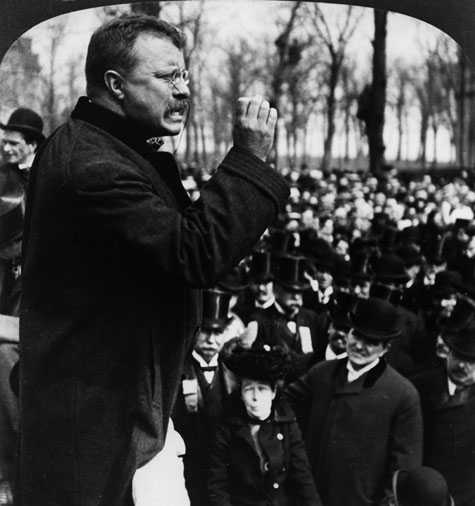On September 6, 1901, an anarchist named Leon Czolgosz shot President McKinley during a public reception at the Pan-American Exposition at Buffalo, New York. Eight days later McKinley died and Theodore Roosevelt became president of the United States. His ascension to the presidency marked the beginning of a new era in national politics.
Although only forty-two, by far the youngest president in the nation’s history up to that time, Roosevelt brought solid qualifications to the office. Son of a well-to-do New York merchant, he had graduated from Harvard in 1880 and studied law briefly at Columbia, though he did not obtain a degree. In addition to political experience that included three terms in the New York assembly, six years on the U. S. Civil Service Commission, two years as police commissioner ofNew York City, another as assistant secretary of the navy, and a term as governor of New York, he had been a rancher in the Dakota Territory and a soldier in the Spanish-American War. He was also a well-known historian: His Naval War of1812 (1882), begun during his undergraduate days at Harvard, and his four-volume Winning of the West (1889-1896) were valuable works of scholarship, and he had written two popular biographies and other books as well. Politically, he had always been a loyal Republican. He rejected the mugwump heresy in 1884, and during the tempestuous 1890s he vigorously denounced populism, Bryanism, and “labor agitators.”
Nevertheless, Roosevelt’s elevation to the presidency alarmed many conservatives, and not without reason. He did not fit their conception, based on a composite image of the chief executives from Hayes to McKinley, of a president. He seemed too undignified, too energetic, too outspoken, too unconventional. It was one thing to have operated a cattle ranch, another to have captured a gang of rustlers at gunpoint; one thing to have run a metropolitan police force, another to have roamed New York slums in the small hours to catch patrolmen fraternizing with thieves and prostitutes; and one thing to have commanded a regiment, another to have killed a Spaniard personally.

Theodore Roosevelt addressing a crowd in Evanston, Illinois, in the early 1900s.
Roosevelt had been a sickly child, plagued by asthma and poor eyesight, and he seems to have spent much of his adult life compensating for the sense of inadequacy that these troubles bred in him. He repeatedly carried his displays of physical stamina and personal courage and his love of athletics and big-game hunting to preternatural lengths. Henry Adams, who watched Roosevelt’s development over the years with a mixture of fear and amusement, said that he was “pure act.”
Once, while fox hunting, Roosevelt fell from his horse, cutting his face severely and breaking his left arm. Instead of waiting for help or struggling to some nearby house to summon a doctor, he clambered back on his horse and resumed the chase. “I was in at the death,” he wrote next day. “I looked pretty gay, with one arm dangling, and my face and clothes like the walls of a slaughter house.” That evening, after his arm had been set and put in splints, he attended a dinner party.
Roosevelt worshiped aggressiveness and was extremely sensitive to any threat to his honor as a gentleman. When another young man showed some slight interest in Roosevelt’s fiancee, he sent for a set of French dueling pistols. His teachers found him an interesting student, for he was intelligent and imaginative, if annoyingly argumentative. “Now look here, Roosevelt,” one Harvard professor finally said to him, “let me talk. I’m running this course.”
Few individuals have rationalized or sublimated their feelings of inferiority as effectively as Roosevelt and to such good purpose. And few have been more genuinely warmhearted, more full of spontaneity, more committed to the ideals of public service and national greatness. As a political leader he was energetic and hard-driving. Conservatives and timid souls, sensing his aggressiveness even when he held it in check, distrusted Roosevelt’s judgment, fearing he might go off half-cocked in some crisis. In fact his judgment was nearly always sound; responsibility usually tempered his aggressiveness.
When Roosevelt was first mentioned as a running mate for McKinley in 1900, he wrote, “The Vice Presidency is a most honorable office, but for a young man there is not much to do.” As president it would have been unthinkable for him to preside over a caretaker administration devoted to maintaining the status quo. However, the reigning Republican politicos, basking in the sunshine of the prosperity that had contributed so much to their victory in 1900, distrusted anything suggestive of change.
Had Roosevelt been the impetuous hothead that conservatives feared, he would have plunged ahead without regard for their feelings and influence. Instead he moved slowly and often got what he wanted by using his executive power rather than by persuading Congress to pass new laws. His domestic program included some measure of control of big corporations, more power for the Interstate Commerce Commission (ICC), and the conservation of natural resources. By consulting congressional leaders and following their advice not to bring up controversial matters like the tariff and currency reform, he obtained a modest budget of new laws.
The Newlands Act (1902) funneled the proceeds from land sales in the West into federal irrigation projects. The Department of Commerce and Labor, which was to include a Bureau of Corporations with authority to investigate industrial combines and issue reports, was established. The Elkins Railroad Act of 1903 strengthened the ICC’s hand against the railroads by making the receiving as well as the granting of rebates illegal and by forbidding the roads to deviate in any way from their published rates.




 World History
World History









